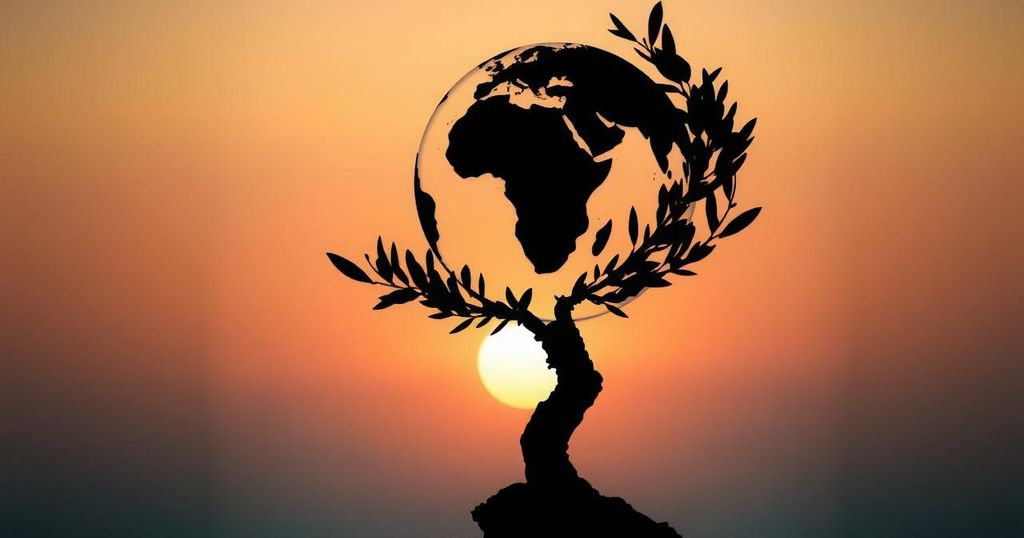Thirteen foreign peacekeepers were killed by M23 rebels in the DRC amid escalating violence. Nations have urged for peace as the UN withdraws non-essential staff from Goma. The conflict has caused significant civilian casualties and mass displacements, drawing international condemnation and calls for diplomatic resolution.
Thirteen soldiers from international peacekeeping forces have been killed during violent clashes in the Democratic Republic of Congo (DRC) with rebels from the M23 group. Among the deceased, nine were South African soldiers, while the casualties also included three Malawian soldiers and one Uruguayan peacekeeper. These fatalities occurred as troops attempted to defend Goma, a vital city under threat from escalating rebel advances.
President Emmanuel Macron of France communicated with leaders from both DRC and Rwanda in response to global calls for a cessation of violence. The situation has prompted the United Nations to evacuate all non-essential personnel from Goma, a city housing over a million inhabitants, amid increasing hostilities. An urgent meeting of the UN Security Council regarding the clashes has been rescheduled due to the deteriorating conflict.
The M23 group has reportedly urged Congolese soldiers in Goma to surrender to prevent further bloodshed. Concurrently, the DRC government has cut diplomatic ties with Rwanda, accusing it of supporting the rebellion. This escalation follows the M23’s recent killing of a Congolese military governor who was visiting the frontline, as well as their seizure of significant territories in eastern DRC.
President Macron’s calls for peace were echoed by Kaja Kallas, the European Union’s foreign policy chief, who urged the M23 to cease its offensive and condemned Rwanda’s alleged backing of the group. Moreover, Angolan President Joao Lourenco criticized the M23 and its supporters, demanding an immediate halt to hostilities to protect civilian lives. Fighting between the M23 and the DRC army has increased significantly since the beginning of the year, leading to extensive territorial acquisitions by the rebels.
The humanitarian crisis has extended to more than 400,000 displaced individuals in DRC this year, with local leaders reporting over 200 civilian deaths in areas under M23 control. Additionally, hospitals in Goma are currently treating numerous patients for injuries related to the fighting. Martin Gordon, an Anglican bishop in Goma, emphasized the urgency of achieving peace, stating that the ongoing conflict has persisted for far too long.
Nations such as the United Kingdom, France, Germany, and the United States have advised their citizens to leave Goma amid growing concerns over safety. Human Rights Watch has issued warnings regarding increasing civilian risks and alleged severe abuses committed by both the Congolese army and the M23 rebels. The UN has signaled that the current conflict exacerbates the already critical humanitarian situation in the region.
The M23 rebels have gained substantial control over mineral-rich areas in eastern DRC since 2021, displacing hundreds of thousands of residents. Both DRC and the UN allege that Rwanda is providing support to the M23, although Rwandan officials have neither confirmed nor denied these claims. Rwanda claims that the DRC’s government collaborates with individuals associated with the 1994 Rwandan genocide, highlighting the strained relations between the two neighbors.
The M23 group emerged in 2012 as a splinter faction from a previous rebel organization, initially claiming to protect the Tutsi population in eastern DRC. This region has historically faced inter-ethnic violence and human rights abuses. The DRC’s eastern provinces are rich in valuable minerals, which both local and foreign interests have long sought to exploit. The ongoing conflict involving the M23 has led to massive displacements and humanitarian crises, often drawing in neighboring countries such as Rwanda, which has raised allegations regarding the DRC’s engagement with historical perpetrators of genocide. Due to the complex historical tensions, the situation remains precarious as international interventions and peacekeeping efforts struggle to stabilize the region. As violence escalates, it becomes increasingly critical for the international community to address the causes and consequences of this conflict, seeking pathways toward long-lasting peace and security for civilians caught in the crossfire.
The recent killing of 13 peacekeepers by the M23 rebels in the DRC underscores the critical escalation of the conflict in the region. International leaders, including President Macron, have called for an end to the violence, yet the situation remains dire as thousands are displaced, and humanitarian needs worsen. The involvement of foreign nations like Rwanda complicates the conflict, necessitating urgent diplomatic efforts to restore stability and protect civilians amid growing humanitarian concerns.
Original Source: www.bbc.com






